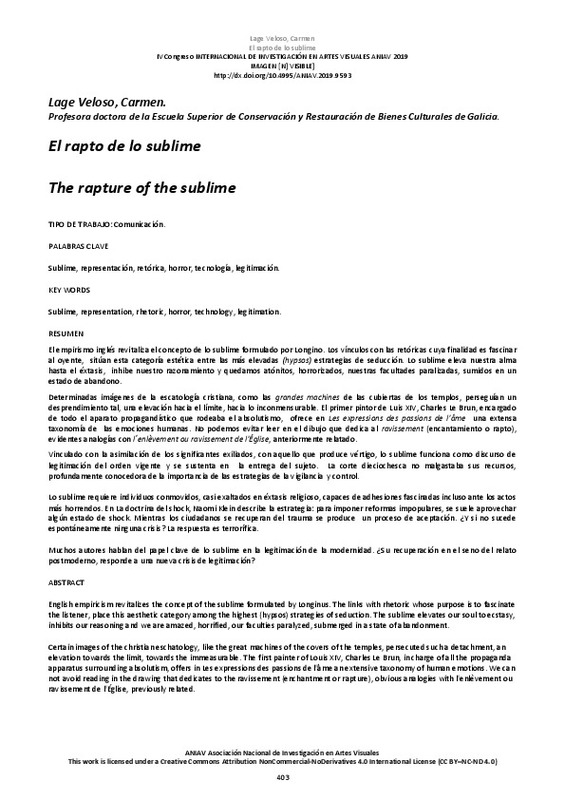|
Resumen:
|
[ES] El empirismo inglés revitaliza el concepto de lo sublime formulado por Longino. Los vínculos con las retóricas cuya finalidad es fascinar
al oyente, sitúan esta categoría estética entre las más elevadas (hypsos) ...[+]
[ES] El empirismo inglés revitaliza el concepto de lo sublime formulado por Longino. Los vínculos con las retóricas cuya finalidad es fascinar
al oyente, sitúan esta categoría estética entre las más elevadas (hypsos) estrategias de seducción. Lo sublime eleva nuestra alma
hasta el éxtasis, inhibe nuestro razonamiento y quedamos atónitos, horrorizados, nuestras facultades paralizadas, sumidos en un
estado de abandono.
Determinadas imágenes de la escatología cristiana, como las grandes machines de las cubiertas de los templos, perseguían un
desprendimiento tal, una elevación hacia el límite, hacia lo inconmensurable. El primer pintor de Luis XIV, Charles Le Brun, encargado
de todo el aparato propagandístico que rodeaba el absolutismo, ofrece en Les expressions des passions de l’âme una extensa
taxonomía de las emociones humanas. No podemos evitar leer en el dibujo que dedica al ravissement (encantamiento o rapto),
evidentes analogías con l´enlèvement ou ravissement de l’Église, anteriormente relatado.
Vinculado con la asimilación de los significantes exiliados, con aquello que produce vértigo, lo sublime funciona como discurso de
legitimación del orden vigente y se sustenta en la entrega del sujeto. La corte dieciochesca no malgastaba sus recursos,
profundamente conocedora de la importancia de las estrategias de la vigilancia y control.
Lo sublime requiere individuos conmovidos, casi exaltados en éxtasis religioso, capaces de adhesiones fascinadas incluso ante los actos
más horrendos. En La doctrina del shock, Naomi Klein describe la estrategia: para imponer reformas impopulares, se suele aprovechar
algún estado de shock. Mientras los ciudadanos se recuperan del trauma se produce un proceso de aceptación. ¿Y si no sucede
espontáneamente ninguna crisis? La respuesta es terrorífica.
Muchos autores hablan del papel clave de lo sublime en la legitimación de la modernidad. ¿Su recuperación en el seno del relato
postmoderno, responde a una nueva crisis de legitimación?
[-]
[EN] English empiricism revitalizes the concept of the sublime formulated by Longinus. The links with rhetoric whose purpose is to fascinate
the listener, place this aesthetic category among the highest (hypsos) strategies ...[+]
[EN] English empiricism revitalizes the concept of the sublime formulated by Longinus. The links with rhetoric whose purpose is to fascinate
the listener, place this aesthetic category among the highest (hypsos) strategies of seduction. The sublime elevates our soul to ecstasy,
inhibits our reasoning and we are amazed, horrified, our faculties paralyzed, submerged in a state of abandonment.
Certain images of the christian eschatology, like the great machines of the covers of the temples, persecuted such a detachment, an
elevation towards the limit, towards the immeasurable. The first painter of Louis XIV, Charles Le Brun, in charge of all the propaganda
apparatus surrounding absolutism, offers in Les expressions des passions de l'âme an extensive taxonomy of human emotions. We can
not avoid reading in the drawing that dedicates to the ravissement (enchantment or rapture), obvious analogies with l'enlèvement ou
ravissement de l'Église, previously related.
Linked to the assimilation of the exiled significants, with that which produces vertigo, the sublime functions as a discourse of
legitimation of the current order and is based on the surrender of the subject. The eighteenth-century court was not wasting its
resources, deeply aware of the importance of surveillance and control strategies.
The sublime requires individuals moved, almost exalted in religious ecstasy, capable of fascination even in the face of the most
horrendous acts. In The Doctrine of Shock, Naomi Klein describes the strategy: to impose unpopular reforms, one usually takes
advantage of some state of shock. As citizens recover from the trauma, there is a process of acceptance. What if no crisis occurs
spontaneously? The answer is terrifying.
Many authors speak of the key role of the sublime in the legitimation of modernity. Does your recovery within the postmodern story
respond to a new crisis of legitimation?
[-]
|








